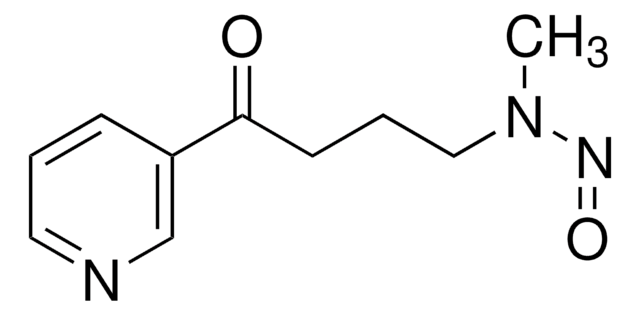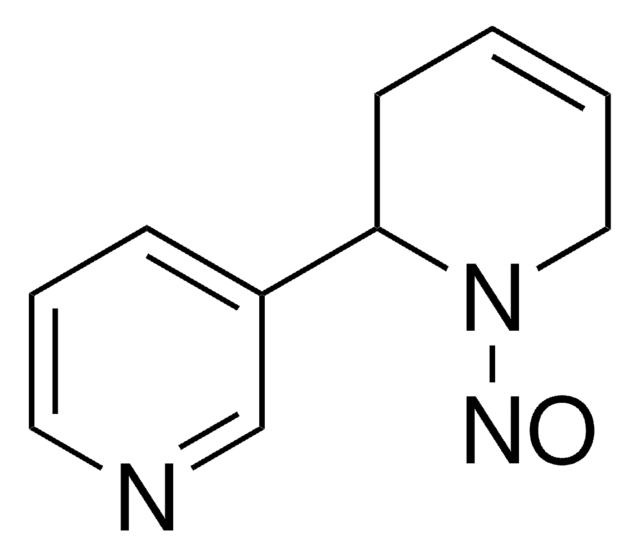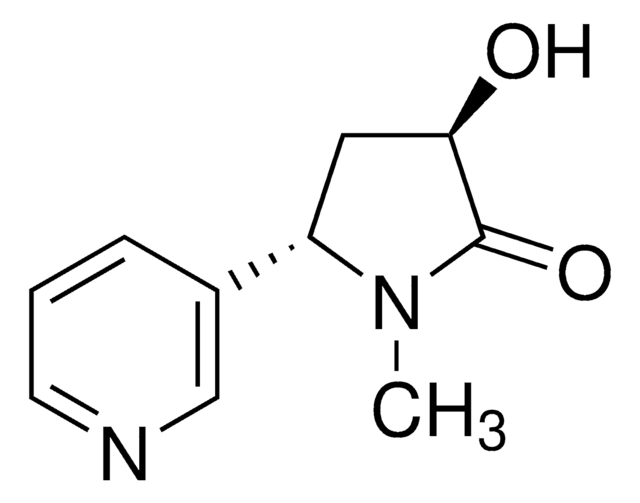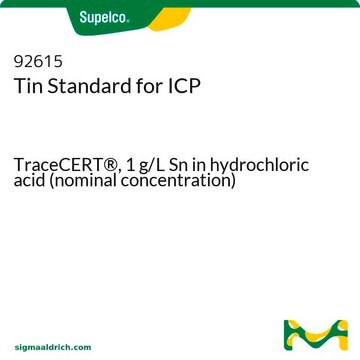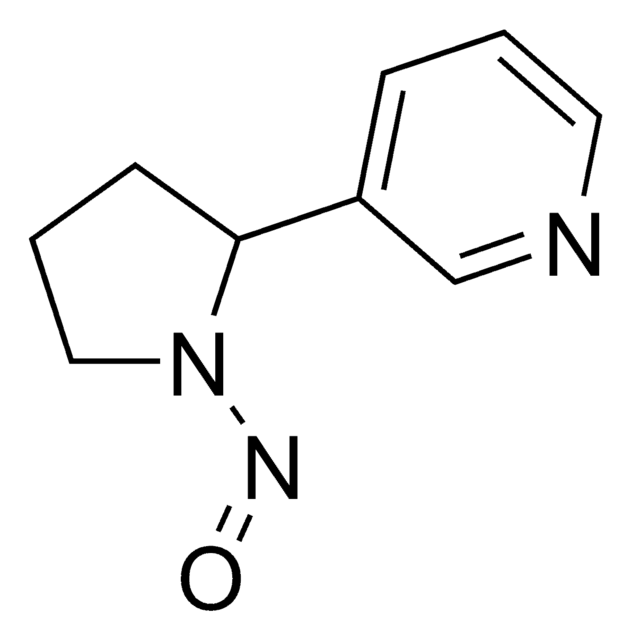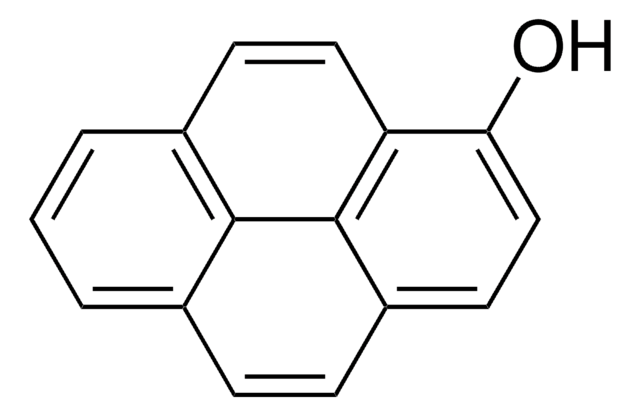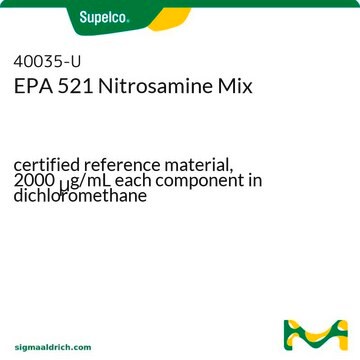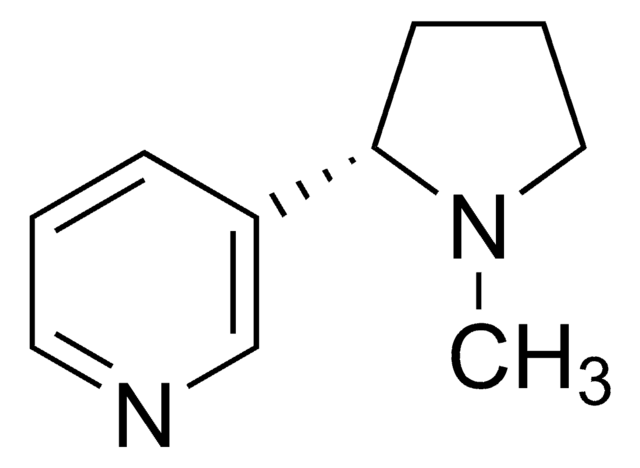모든 사진(1)
About This Item
실험식(Hill 표기법):
C10H15N3O2
CAS Number:
Molecular Weight:
209.25
MDL number:
UNSPSC 코드:
41116107
PubChem Substance ID:
NACRES:
NA.24
추천 제품
Grade
analytical standard
Quality Level
분석
≥92.0% (TLC)
유통기한
limited shelf life, expiry date on the label
기술
HPLC: suitable
gas chromatography (GC): suitable
solid phase extraction (SPE): suitable
응용 분야
cleaning products
cosmetics
food and beverages
personal care
형식
neat
저장 온도
2-8°C
SMILES string
CN(N=O)CCCC(O)C1=CN=CC=C1
InChI
1S/C10H15N3O2/c1-13(12-15)7-3-5-10(14)9-4-2-6-11-8-9/h2,4,6,8,10,14H,3,5,7H2,1H3
InChI key
OGRXKBUCZFFSTL-UHFFFAOYSA-N
일반 설명
4-(Methylnitrosamino)-1-(3-pyridyl)-1-butanol is one of the major metabolite of nitrosamine 4-(methylnitrosamino)-1-(3-pyridyl)-1-butanone, which is a carcinogen responsible in inducing lung cancer in smokers.
Standard for Supelco MIP SPE cartridges. For more information request Supelco Literature T407075, T706031
애플리케이션
Refer to the product′s Certificate of Analysis for more information on a suitable instrument technique. Contact Technical Service for further support.
Storage Class Code
11 - Combustible Solids
WGK
WGK 3
Flash Point (°F)
Not applicable
Flash Point (°C)
Not applicable
개인 보호 장비
Eyeshields, Gloves, type N95 (US)
이미 열람한 고객
E M Leslie et al.
The Journal of biological chemistry, 276(30), 27846-27854 (2001-05-29)
Nitrosamine 4-(methylnitrosamino)-1-(3-pyridyl)-1-butanone (NNK) and its metabolite 4-(methylnitrosamino)-1-(3-pyridyl)-1-butanol (NNAL) play a crucial role in the induction of lung cancer, and NNAL-O-glucuronide formation and elimination are important steps in detoxification of these compounds. In the present study, we investigated the ATP-binding cassette
S S Hecht et al.
Carcinogenesis, 18(9), 1851-1854 (1997-11-05)
4-(Methylnitrosamino)-1-(3-pyridyl)-1-butanol (NNAL) is an important metabolite of the tobacco-specific nitrosamine 4-(methylnitrosamino)-1-(3-pyridyl)-1-butanone (NNK). Using the chiral derivatizing agent, (R)-(+)-alpha-methylbenzyl isocyanate [(R)-(+)-MBIC], previous work has shown that the enantiomeric ratio of metabolically formed NNAL and its glucuronide derivative may be species dependent.
S S Hecht et al.
Cancer epidemiology, biomarkers & prevention : a publication of the American Association for Cancer Research, cosponsored by the American Society of Preventive Oncology, 4(8), 877-884 (1995-12-01)
Epidemiological studies indicate that vegetable consumption protects against lung cancer in humans, but the protective constituents have not been identified. Phenethyl isothiocyanate (PEITC), which is release upon chewing of watercress (nasturtium officinale), is a chemopreventive agent against lung cancer induced
G M Lackmann et al.
Journal of the National Cancer Institute, 91(5), 459-465 (1999-03-10)
Cigarette smoking during pregnancy can result in fetal exposure to carcinogens that are transferred from the mother via the placenta, but little information is available on fetal uptake of such compounds. We analyzed samples of the first urine from newborns
G B Smith et al.
Carcinogenesis, 20(9), 1809-1818 (1999-09-02)
Metabolism of the tobacco-specific nitrosamine 4-(methylnitrosamino)-1-(3-pyridyl)-1-butanone (NNK) was characterized in human lung cells isolated from peripheral lung specimens obtained from 12 subjects during clinically indicated lobectomy. NNK biotransformation was assessed in preparations of isolated unseparated cells (cell digest), as well
자사의 과학자팀은 생명 과학, 재료 과학, 화학 합성, 크로마토그래피, 분석 및 기타 많은 영역을 포함한 모든 과학 분야에 경험이 있습니다..
고객지원팀으로 연락바랍니다.